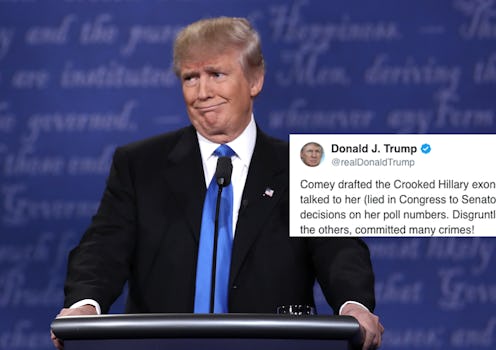News
Trump Responded To Comey's Interview With Some Heated Accusations Of His Own

Former FBI Director James Comey took to national television Sunday night to spill the beans on, most notably, his interactions with President Donald Trump. Less than 24 hours later, Trump responded to the Comey interview on Twitter by accusing him of committing "many crimes."
In the interview on ABC News' 20/20 Comey said that Trump is "morally unfit to be president." He added, "Our president must embody respect and adhere to the values that are at the core of this country. The most important being truth. This president is not able to do that."
With comments like that, Trump decided not to sit quietly, instead responding via Twitter and posting:
Comey drafted the Crooked Hillary exoneration long before he talked to her (lied in Congress to Senator G), then based his decisions on her poll numbers. Disgruntled, he, McCabe, and the others, committed many crimes!
In the interview, Comey had addressed in detail his statement that he gave announcing that the FBI had decided to decline prosecuting Hillary Clinton. The FBI had been investigating the use of a private email server during her time as secretary of state. Comey told ABC's George Stephanopoulos that he changed his wording to make it easier to understand for the American people.
"So my first draft, which I wrote myself, said, 'Gross negligence,'" Comey told Stephanopoulos. "And then my staff convinced me that that's just going to confuse all kinds of people, if you start talking about statutes and what the words mean. What's a colloquial way to explain it? And elsewhere in my statement I had said, 'Extremely careless.' And so they said, 'Just use that.' And so that's what I went with."
Comey explained that he ultimately would have changed the language even more and gotten to the point earlier in the statement, not dwelling on Clinton's mistakes until the very end.
But Trump's accusation came first from Republican Sens. Lindsey Graham and Chuck Grassley. They argued last fall that Comey had started drafting the letter before interviewing her. In September in front of the House Judiciary Committee, Comey denied making the decision not to charge before interviewing Clinton.
"All I can do is to tell you again, the decision was made after that, because I didn’t know what was going to happen in that interview. She maybe lied in the interview in a way we could prove," Comey told the committee.
Clinton spoke to the FBI in July and Comey started his draft in May. Comey told Stephanopoulos what he was thinking:
If you've been investigating for a year, you know that, unless things change, we're going to head in this direction. Prosecutors and investigators all the time draft indictments before they finish the investigation. Their mind is open that if they find something that changes their view, they won't bring an indictment. But they know where it's headed after a year of investigation. Same thing here.
As for the accusation about making decisions based on poll numbers, Comey did say that the poll numbers likely affected his decision. Stephanopoulos asked Comey if he thought that Clinton would affect his decision.
"It must have been," Comey said. "I don't remember consciously thinking about that, but it must have been. 'Cause I was operating in a world where Hillary Clinton was going to beat Donald Trump. And so I'm sure that it —that it was a factor. Like I said, I don't remember spelling it out, but it had to have been. That — that she's going to be elected president, and if I hide this from the American people, she'll be illegitimate the moment she's elected, the moment this comes out."
Trump's accusations may hold some water, but when you hear Comey's side, "many crimes" doesn't fit.